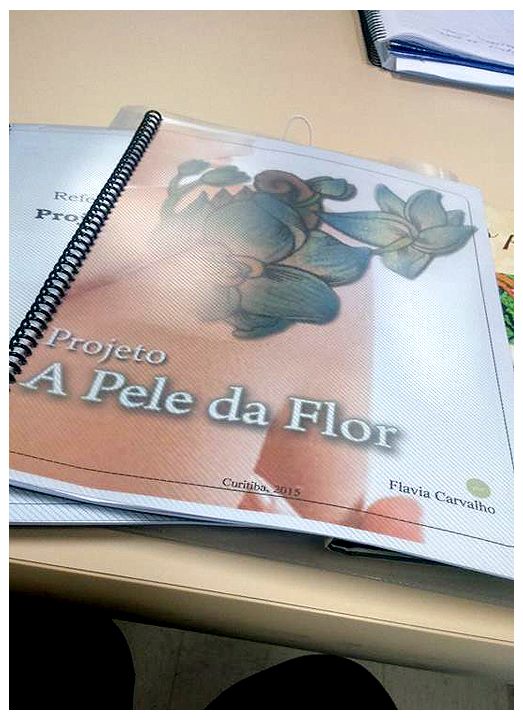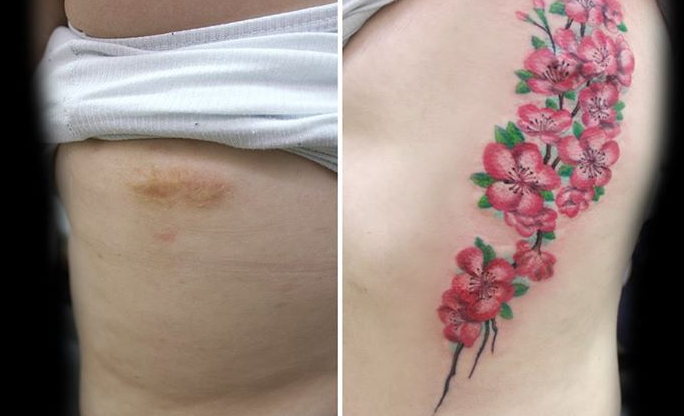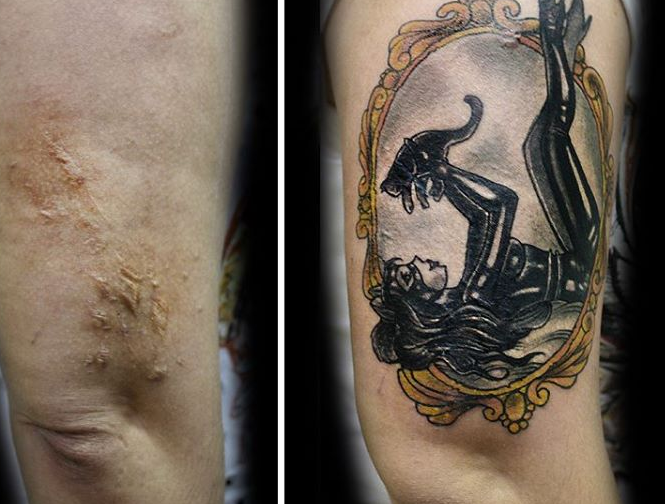What This Tattoo Artist is Doing To Help Domestic Violence Victims

By:
Flavia Carvalho, a 31-year-old tattoo artist from Brazil, provides free tattoos to women with scars from domestic violence, and/or scars from mastectomies. Through her project, "A Pele da Flor" ("The Skin of the Flower"), she aims to help turn the negative experience of domestic abuse into something empowering and beautiful.
 Flavia Carvalho - facebook.com
Flavia Carvalho - facebook.com
"I run the project alone, since no other tattoo artist has expressed interest in participating," Carvalho recently told the Huffington Post. "The project's name refers to the Portuguese expression 'A flor da pele' (deeper than skin), which speaks of how strongly we feel when facing an extremely difficult or challenging situation. 'A Pele da Flor' also alludes to the fact that all of us women are like flowers and deserve to have our skin protected and embellished."
She added that women have showed her ample gratitude for the project, and that she loves seeing the ladies express themselves freely on social media after coming in for her free tattoo services.
"The sense of affection, sisterhood, and camaraderie is deeper than I ever imagined," she said. "They contact me from all over the country, as well as from abroad. They come to the studio, share their stories of pain and resilience, and they show me their scars. Embarrassed, they cry, and hug me ... It is wonderful to see how their relationship with their bodies changes after they get the tattoos. I follow many of them on Facebook, and I see how, after being ashamed of their scarred bodies, they now post pictures in dresses, and they look happy, changed. It is transformative."
Warning: The images below are graphic.
 Flavia Carvalho - facebook.com
Flavia Carvalho - facebook.com
This woman got a tattoo to cover a scar from being shot by her boyfriend.
 Flavia Carvalho - facebook.com
Flavia Carvalho - facebook.com
This woman was stabbed with broken glass.
The larger issue of domestic abuse.
Carvalho said her tattoo project has also been successful in spreading awareness on the problem of domestic abuse. According to Safe Horizon, the largest U.S. organization serving victims of domestic abuse, women ages 18 to 34 have the highest risk of falling victim to domestic violence. More than 4 million women are victims of physical assault and rape by their partners, and more than 3 million children witness domestic violence in their homes annually.
Over the summer, blogger Emma Murphy posted a heartbreaking video on Facebook alleging domestic abuse from her partner, with whom she has two children. In the clip below, the Irish mother explains with a black eye that she has finally left this man, who allegedly punched her in the face when she confronted him about cheating on her. When this video went viral, her partner said he pushed Murphy and slept with another woman but never punched Murphy.
Below, she describes the psychological and physical harm allegedly perpetrated by her then-partner:
"On Father's Weekend, he didn't see us. He spent his time with somebody else ... So I went to the gym and I confronted him. And he denied it of course, and when I threw his phone, he punched me in the face. And it wasn't the first time. Last year he split my head open at an event, and prior to that he punched me as well and I had a black eye. And for the last year and a half, I've been told I'm paranoid. I'm a psycho. I'm nuts. My insecurities will kill me one day. Even up until now, he tells me that my insecurity is going to kill me. And you know what? ... I finally realized that no, this is not acceptable. No man has any right to put his hand on a woman ... Now that I've realized that, I've had the courage to walk away and to go straight to my family and friends and people who love me. I have the courage to actually do something about it this time because even once, it's unacceptable, but to be made feel that it is acceptable is even worse. To be mentally tortured or told you're paranoid and insecure, that's mental torture, and no man should do that to anyone."
Last year, on the 20th Anniversary of the Violence Against Women Act (VAWA), Vice President Joe Biden called domestic violence "the most vicious form of violence there is."
Biden has fought against domestic violence for a long time, and he helped write VAWA as a senator. As ATTN: previously noted, it "provides greater funding for the investigation of incidents of domestic violence, and according to the White House, has lowered the rate of intimate partner violence by 67 percent since it's enactment."
During an interview with the TODAY Show about Ray Rice's highly publicized NFL exit following a domestic violence incident with his wife, Biden said, "It's never, never, never the woman's fault. No man has a right to raise a hand to a woman. No means no."
Biden told TODAY that colleges need to take care of their young female students as well.
"The next challenge is making sure, ironically, we get college presidents and colleges to understand that they have a responsibility for the safety of women on their campus. They have a responsibility to do what we know from great experience works. Bringing the experts. Provide people, give the young woman the support that she needs. Psychological support. the medical support, and if need be, the legal support. Societal changes taking place. It takes time. But I really believe it's taking root, and we have an obligation to just keep pushing it."
Tattoos as a symbol of empowerment.
Many have used tattoos as a symbol to destigmatize issues including suicide and mental health. As ATTN: previously noted, "[o]pening up about mental health issues is a powerful way to show others that they are not alone with their struggles. Having a tattoo that symbolizes something important about mental health also sends the message that such issues are nothing to be ashamed of."
ATTN: also highlighted Project Semicolon, a campaign that aims to present "hope and love to those who are struggling with depression, suicide, addiction, and self-injury." Project Semicolon encourages people to tattoo or draw a semicolon on their bodies in support of the project's message.
“A semicolon is used when an author could’ve chosen to end their sentence, but chose not to,” the project site reads. “The sentence is your life and the author is you.”
If you are the victim of domestic abuse, and are looking for help you can reach the National Domestic Violence Hotline at 1-800-799-7233.
